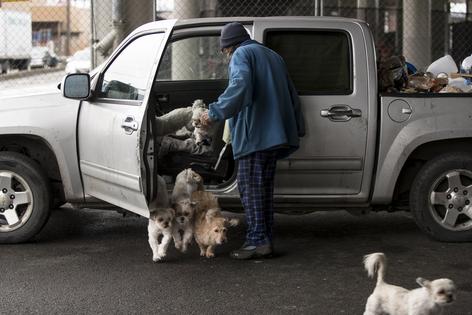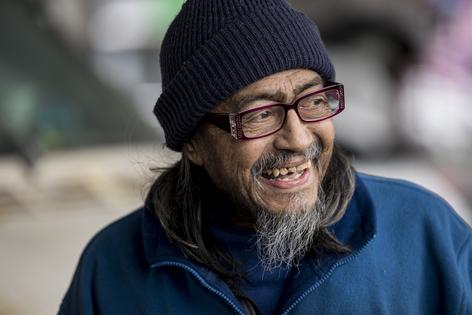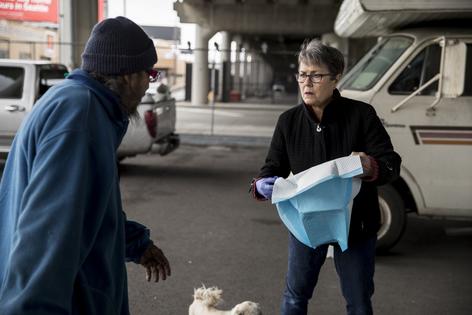Sick and living in an RV, Seattle man finds coronavirus outbreak just makes it harder
Published in Senior Living Features
SEATTLE - Sergio Patino cracks open the door to the silver truck parked under the Spokane Street Bridge, and in an instant, a fluffy mob is unleashed. They are Patino's seven very small, very jumpy dogs: Chata, Chuco, Chico, Julia, Mimi, Cujo and Chilaquil.
"They are my babies," the 70-year-old says.
Patino, born in Brownsville, Texas, and raised partly in Mexico City, has lived in vans, RVs and apartments in Seattle for nearly 20 years after several years working on fish processing boats in Alaska. He saved Chilaquil, a Jack Russell terrier, after the dog was hit by a car four years ago. The shih tzu named Chata birthed her puppies on Patino's foot while he was sleeping in the truck.
The dogs are in good health, but Patino's is on the decline. He had surgery for colon cancer several years ago, which left him with a colostomy bag, and his kidneys are in trouble. He's been having problems sleeping and it gets extremely cold in the RV he stays in near the truck.
The coronavirus outbreak is making a precarious living situation even more difficult. The usual places Patino goes to get water have shut down or locked their spigots during the pandemic. He says the laundry and hygiene services he usually calls to make an appointment have not been calling him back.
As several homelessness programs have turned their focus to making sure people already living in crowded shelter conditions are spread apart and staying healthy, some people like Patino are largely left to fend for themselves during the public health crisis. Patino has received some help with food and supplies from city-contracted outreach program REACH, but REACH is among the few outreach programs that are still doing their typical work. More than 5,200 people live unsheltered in King County, more than 2,000 of them living in their vehicles.
For Patino, the limited shelter options available in Seattle, even amid a pandemic, represent a loss. Going into a shelter would likely mean losing his dogs - not that joining an already crowded shelter at this time would be advisable - and dialysis to him means "living one day to the next to go to the hospital." The city has pledged to add new shelter units to the city's current capacity during the crisis, but has not yet done so.
"All my freedom would be lost," Patino says.
He is used to surviving on his own. He has long lived alone, finding joy in listening to the oldies station on the radio and reading detective and drama books by flashlight in his RV.
As options for services outside dwindle during the coronavirus outbreak, less-official channels are helping him out.
Gaye Davies, the owner of a dog day care program who met Patino through a mutual friend, has been bringing him water, food and medication.
On a recent Wednesday, parking enforcement had told Patino he had to move within a few days in order for Seattle Public Utilities to access an electrical vault, but Patino's RV wouldn't run. Davies panicked and brought her neighbor, a mechanic, in order to help.
"I'm really concerned about him," says Davies. "He's such a good heart."
And the reality is, there are very few safe places for Patino to go. The city has 12 safe parking spaces, which allow people living in cars to park and access social services, but those are only for passenger vehicles. The city has suspended enforcement of its 72-hour parking rule while the pandemic spreads, but it lags behind other cities with major unsheltered homeless populations when it comes to providing access to hygiene services.
Still, Patino is getting by, and prioritizing his animals. He's been hauling scrap metal he found on the sidewalk in order to fill in the shih tzu-sized gaps in the fence surrounding his truck and RV, so the dogs can run around freely.
"These folks are very creative and they find a way to survive," Rev. Bill Kirlin-Hackett, director of the Interfaith Task Force on Homelessness, says. "I credit them with that, and at the same time I wish they didn't have to live this way."
Among Patino's friends, concern is increasing over his condition. He used to meet with a friend at Burger King on Fourth Avenue South, where he could get water and his dogs would go crazy for chicken nuggets. But now, as people are social distancing, Patino is worried about what will happen to his dogs if he falls ill.
When Patino first met staffers at Emerald City Pet Rescue a year and a half ago to get his dogs caught up on vaccines, "he was very cautious and untrusting," but he built a relationship with employees, said clinic coordinator and veterinary assistant Mequela Lucero. Patino began to offer to pull weeds or clean floors at the facility in exchange for getting water there. He even offered to exchange his labor for the vets' care for the dogs, though the staffers at the pet rescue would never accept that.
"The unconditional love he has for his dogs is astonishing," Lucero says. "He makes sure that they are taken care of first."
The dogs helped him recover from cancer, Patino says. Taking care of them helped him stay active.
"They're my life," he says. "Practically I have nothing else to live for other than my dogs."
Friends have urged Patino to get dialysis, but he has other plans.
"I know what dialysis is, but I'd rather not do it," he says. He's spent a large part of his life traveling across the country - working at various factories, hanging out with hippies in Chicago, seeing as much live music as he possibly can. Today, he tells stories of seeing Jimi Hendrix, The Doors and The Animals in concert.
Patino has another dream, too. Before he dies, he wants to get a big van, collect thousands of pounds of aluminum cans and sell them. He's also dreamed up a plan to travel from state to state, entering fishing contests. He doesn't know if he would be any good at them, but the idea sounds like a fine adventure to him.
For now, the plans are more immediate. He's trying to figure out how to let people know the dogs need help if something happens to him. Maybe a flag or light on the outside of his RV to let others know he's OK.
Visit The Seattle Times at www.seattletimes.com












Comments